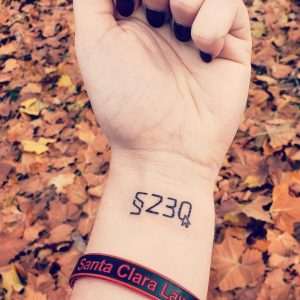Once Again, Section 230 Protects Twitter’s Account Suspension Decisions–Brittain v. Twitter
 This is another easy defense win in a pro se case, and yet another lawsuit indirectly involving Trump and his supporters. Twitter suspended four accounts run by Craig Brittain of IsAnybodyDown? “revenge” porn infamy. Brittain sued. My prior blog post about Twitter’s venue selection clause.
This is another easy defense win in a pro se case, and yet another lawsuit indirectly involving Trump and his supporters. Twitter suspended four accounts run by Craig Brittain of IsAnybodyDown? “revenge” porn infamy. Brittain sued. My prior blog post about Twitter’s venue selection clause.
Twitter defended against the suit primarily on Section 230 grounds. The court applied Section 230(c)(1)’s standard 3-part test:
- ICS Provider: Twitter qualifies (cites to Dehen, Fields, Frenken v. Hunter).
- Publisher/Speaker claim: Citing Barnes, the court says content removal is part of publishing content. Further cites to Darnaa v. Google, Lancester v. Alphabet, Sikhs for Justice v. Facebook, DeLima v. YouTube, Green v. YouTube, Mezey v. Twitter. The court says: “Brittain’s claims against Twitter, except his claim for violation of antitrust laws, arise out of Twitter’s deletion of the Brittain Accounts: (1) violation of the First Amendment; (2) violation of federal election law; (3) breach of contract; (4) conversion, (5) negligent infliction of emotional distress; (6) tortious interference; and (7) promissory estoppel.”
- Third party content: “Brittain expressly acknowledges that he, not Twitter, created and operated the accounts.”
Yet another case where Section 230(c)(1) does the work that we thought would be performed by 230(c)(2), but without the need to establish good faith.
The antitrust claim fails on its own lack of merit. The court says Brittain’s allegations show, at most, “conscious parallelism,” and loss of Twitter followers does not constitute an antitrust injury sufficient for standing.
The court summarizes:
While the Court can understand the frustration which may occur if a person’s Twitter account is suspended, unless a legal cause of action can be articulated, a lawsuit cannot be sustained. Nor is the person entitled to discovery on the general issues upon which the complaint is based, unless a legal claim can be stated. Here, the complaint is fundamentally flawed.
Case citation: Brittain v. Twitter, Inc., 2019 WL 2423375 (N.D. Cal. June 10, 2019)

Pingback: Twitter Gets Another Significant Section 230 Win in Lawsuit by Suspended User-Murphy v. Twitter - Technology & Marketing Law Blog()
Pingback: The Plaintiff Is Probably Pissed About Section 230-Fyk v. Facebook - Technology & Marketing Law Blog()